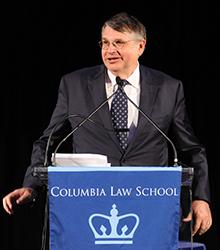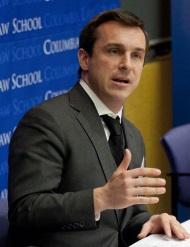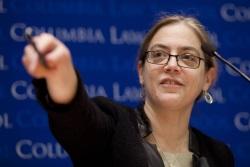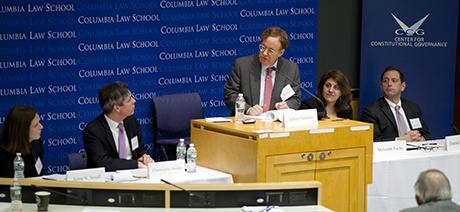At the Crossroads of Administrative Law and Financial Regulation
Scholars, Practitioners, and Top Government Lawyers Discuss Overlap—and Tensions—Between the Fields at Columbia Law School Symposium
New York, March 25, 2014—Critical new interactions between administrative law and financial regulation in the wake of the recent economic crisis mean the legal community must confront tensions between the traditionally distinct fields, according to leading scholars, practitioners, and general counsels of four powerful financial regulators who gathered last month at Columbia Law School.
The “Administrative Law and Financial Regulation Symposium,” sponsored jointly by the Law School’s Center for Constitutional Governance and Ira M. Millstein Center for Global Markets and Corporate Ownership, emphasized how the complexity and speed of financial regulation have come into tension with administrative law in the years since the financial crisis led to the passage of the Dodd-Frank Wall Street Reform and Consumer Protection Act of 2010.
| Professor Thomas W. Merrill |
Thomas W. Merrill, the Charles Evan Hughes Professor of Law at Columbia Law School and an expert on administrative law, highlighted the friction between the two fields at the event.
“Classic administrative law is slow, multi-level, elaborate, and heavily lawyered,” Merrill said. “Financial regulation is very fast and requires regulators to move quickly and decisively. We’re going to see tension and conflict when administrative law comes up against the realities of finance.”
The symposium reflected Columbia Law School’s leadership in the national discussion about new realities of financial regulation under Dodd-Frank. As Forbes recently noted, the Law School has added a host of new courses about the legal framework of the financial markets, the institutions that give rise to systemic risk, and lessons from the Great Recession.
| Professor Kathryn Judge |
The first panel discussion, on the Federal Reserve and administrative law, featured presentations by Columbia Law School Professor Kathryn Judge and Duke Law School Professor Steven L. Schwarcz ’74. Judge introduced a theory of “soft constraints,” or cultural norms—like guiding principles and reputational concerns—that govern agencies like the Federal Reserve in the absence of more formal oversight mechanisms. Margaret E. Tahyar ’87, a partner at Davis Polk & Wardwell and a lecturer at Columbia Law School, and Michael S. Barr, a University of Michigan Law School professor who was a key architect of the Dodd-Frank Act as assistant secretary of the Treasury, provided commentary.
| Professor Robert J. Jackson Jr. |
“Whatever one believes about cost-benefit analysis—how it should be done, how much weight it should be given, and whether it can be done effectively,” Jackson said, “we can all agree that generalist federal courts are not the government institution that should be doing it.”
Columbia Law School Professor and Vice Dean Gillian E. Metzger ’95 presented her views on how financial regulation differs from other forms of administrative law during the third panel, “Approaching Financial Regulation from an Administrative Law Perspective.”
| Professor Gillian E. Metzger '95 |
“Administrative law emphasizes accountability while financial regulation emphasizes independence from political pressure,” Metzger said. Harvard Law School Professor Adrian Vermeule and the Wharton School Assistant Professor David Zaring provided commentary.
During the final panel of the day, the general counsels of four powerful financial regulators—New York’s Department of Financial Services, the Consumer Financial Protection Bureau, the Department of the Treasury, and the Securities and Exchange Commission—offered their views in a discussion moderated by Columbia Law School Professor Jeffrey N. Gordon. Daniel Alter provided perspectives from New York’s top financial regulator, while Meredith Fuchs and Christopher Meade gave the view from the general counsel’s office at the CFPB and Treasury Department. Anne Small, who was recently named general counsel of the SEC after serving as associate counsel to President Obama, reflected on the day’s proceedings from the point of view of the nation’s top securities regulator.
| Professor Jeffrey N. Gordon moderates a discussion with general counsels of four important financial regulators: (l-r) Anne K. Small, Christopher Meade, Meredith Fuchs, and Daniel Alter. |
Tahyar, who counseled many of the world’s largest banks as they faced the brink of the financial crisis and who now teaches The Regulation of Systemic Risk: Financial institutions and the Challenge of Too Big to Fail at the Law School, stressed the importance of Columbia Law School’s leadership in bringing financial regulation and administrative law together
“Now is the time, and this is the place, to rethink how the basic curriculum for financial regulation is taught,” Tahyar said. “The largest weight of financial regulation is administrative law. We live in an administrative state.”
The “Administrative Law and Financial Regulation Symposium” was made possible through the generous support of The F.F. Randolph, Jr. Speakers Fund.




